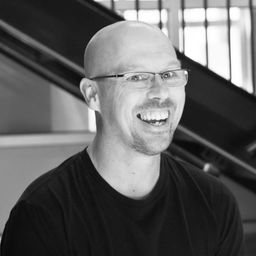
Mr. Aaron Nelson
Aaron Nelson Bio
Currently Aaron is the Associate Director at Medalta, a museum, residency, research and education centre in Medicine Hat Alberta. This position has allowed him to develop relationships with a regional, national and international community of makers, academics and arts administrators and thus contextualize the diversity of contemporary approaches to delivering cultural content.In addition to his work as an arts administrator, consultant and technical educator, Aaron also maintains an active studio practice. Currently his studio research focuses on the intersection of digital technology and traditional ceramic practice. He has lectured on this topic throughout Canada and his research has been supported by the Canada Council for the Arts, The Alberta Foundation of the Arts, and the National Research Council
Sessions in which Mr. Aaron Nelson attends
viernes 3 junio, 2016
Welcome addresses and cocktail, followed by the Concordia Signature Event "The Garden of the Grey Nuns". As the opening ceremony and cocktail take place in the former Grey Nuns' Motherhouse, recycled into campus residence and reading rooms by Concordia University, delegates will also have the possibility to discover the video Three Grey Nuns (3 minutes, by Ron Rudin and Phil Lichti. Three Grey Nuns recount their memories of communal life in the Grey Nun’s Motherhouse. Built...
sábado 4 junio, 2016
What if we changed our views on heritage? And if heritage has already changed? While, on the global scene, states maintain their leading role in the mobilization of social and territorial histories, on the local scale, regions, neighbourhoods and parishes have changed. Citizens and communities too: they latch on to heritage to express an unprecedented range of belongings that no law seems to be able to take measures to contain, often to the discontent of...
This session explores artist-history exchanges in the context of heritage sites, venues and spaces, and considers recent curatorial and artistic interventions and performative strategies, such as decolonial methodologies. Drawing on disciplinary art history, this session approaches heritage sites as strategically re-deployed historic structures that function as representational signs – artifactual objects furnished with other objects that cumulatively and, by virtue of their provenance, pr...
In many parts of Europe and North America, but also in Australia, Japan and parts of China, regions of heavy industry, in particular regions of coal and steel industries, have been in decline since the 1960s. In many of these regions, the transition to post-industrial landscapes has provoked discussions surrounding industrial heritage, what to do with it and for which purposes. One of the most ambitious industrial heritage projects was initiated in the Ruhr region of Germany from the 1960s on...
Most of what we experience as heritage emerges into conscious recognition through a complex mixture of political and ideological filters, including nationalism. In these processes, through a variety of devices (museums, scholarly research, consumer reproduction, etc.), dualistic classifications articulate a powerful hierarchy of value and significance. In particular, the tangible-intangible pair, given legitimacy by such international bodies as UNESCO, reproduces a selective ordering of cul...
domingo 5 junio, 2016
Canal: Walking the Post-Industrial Lachine Canal (COHDS, 2013 - bilingual) is an audio-walk and booklet that takes listeners from the Atwater Market to the Saint Gabriel Lock, exploring the post-industrial transformation of a once heavily industrialized area. The Lachine Canal area has undergone dramatic changes, as mills and factories were closed and then demolished or converted into high-end condominiums. The adjoining working-class neighbourhoods ...
Digital installations and interventions have been seen as a promising ways to support and foster dialogue in museum exhibitions. How does this potential translate into practice and does it enable reflexive and critical approaches towards heritage-making? This session aims to explore how digital installations and interventions in the context of museum exhibitions envision the notion of the ‘dialogic museum’. It particularly aims to articulate and problematize the role of digital in...
"What does heritage change?" is a multifaceted question to which the answer(s) are in primary respects related to real-life negotiations among different groups of citizens, cultures, races, ethnic groups, sexual identities, and social classes about received, official and/or widely accepted or accomodated intangible attributes, cultural traditions, historic monuments, buildings, and other transmitted or revived historical legacies. Heritage designated by and for whom, for what motivations, an...
lunes 6 junio, 2016
Le patrimoine fait aujourd’hui l’objet d’attentions autant que d’agressions et de destructions. Cela peut s’expliquer par les difficultés de son identification ou de sa conservation. Cela peut plus profondément s’expliquer parce que, dès le départ, il célébre un événement ou conserve une mémoire qui peut être ou devenir une source de dissenssions et de conflits politiques. Enfin, sa reconnaissance suscite des gains économiques pour les uns mais des pertes pour les autres. Mais peut-être...










